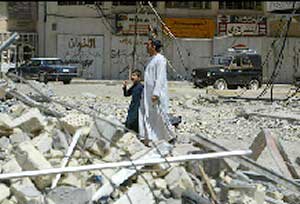At least two Bradleys had approached the checkpoint to help out during the firefight when they both rolled over, the military said Sunday. The incident was under investigation. There was no further information on the fighting. Defense Secretary Donald H. Rumsfeld said, meanwhile, U.S. troops would stay in Iraq and Afghanistan until those countries are stable and democratic governments have taken control. Rumsfeld made his remarks en route to the Persian Gulf and South Asia to thank forces "deeply involved in the successes we've achieved in Iraq and Afghanistan." In Baghdad, coalition forces and ORHA - the reconstruction agency - are pushing to get the city's infrastructure back together as quickly as possible because residents have grown increasingly restless from living without electricity, running water, telephone service or sewage disposal. Anger and anti-American sentiment flared white hot Saturday after a U.S.-held weapons cache laden with 80 Iraqi missiles exploded on the edge of Baghdad, killing at least six people and showering homes for miles around with warheads, rockets and mortars. The U.S. military blamed unknown attackers who they said fired four flares into the sprawling open missile dump. But hundreds of enraged, screaming Iraqis blamed Iraq's new American overseers. Wailing women collapsed over the coffins of two adults and four teenagers. "No Saddam! No Bush! Yes to Islam!" fist-waving men shouted. The disaster touched off protests in the stricken Zafaraniyah neighborhood and in the city center. Residents near the blast fired on U.S. troops trying to help the wounded, briefly driving the soldiers from the scene. An American soldier suffered a broken arm in the attack. The New York Times, quoting an anonymous U.S. military official, said the Iraqi toll could go much higher. U.S. Central Command spokesman Lt. Mark Kitchens blamed "despicable people" for allegedly firing the flares. In Baghdad, Schollum said ORHA officials were meeting with the old city government's deputy mayor for technical services and deputy mayor for administration, among others. "The mayor - a political appointee - obviously has fled," he Schollum. American troops took control of Baghdad on April 8 and Garner arrived with his staff Monday to put together a new government for Baghdad and the rest of Iraq. The ORHA specialists were meeting with about 10 senior Iraqi officials. Schollum said ORHA began paying some municipal workers in U.S. dollars Saturday. Garner has been urging all Iraqi civil servants to report back to duty. Schollum said the ORHA team hopes that municipal workers might begin picking up the city's huge accumulations of garbage as early as Monday. The Monday meeting in Baghdad is one in a series intended to produce a new president for Iraq. The first such meeting, April 15, came just a week after U.S. forces took control of Baghdad and toppled Saddam's ruling Baath Party government. Fewer than 100 representatives of Iraqi opposition groups attended, and some groups boycotted in protest of U.S. influence over the process. Between 300 and 400 representatives of political organizations and interest groups are expected to take part in the all-day meeting Monday, Bodine said. She would not say exactly who was attending, or whether groups that had boycotted the previous meeting, particularly the Iran-based Supreme Council for the Islamic Revolution in Iraq, would show up. She did say that Ahmad Chalabi of the Iraqi National Congress had been invited. Chalabi is widely tipped as the Pentagon's choice to be Iraq's interim president. He did not attend the Ur meeting, but his representatives did.
|
